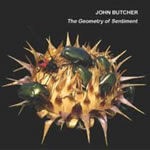|
|
 |
Dusted Reviews
Artist: John Butcher Album: The Geometry of Sentiment Label: Emanem Review date: Jul. 15, 2008 |

|
|
|
 |
To say improvising saxophonist John Butcher uses extended techniques is off the mark, misleading even. For sure, what Butcher does with the iconic jazz instrument is an extension, but it's the kind of extension that results in evolutionary shifts and a body of work that requires deep study. In short, over the course of his solo albums and numerous collaborations, he's developed a new language, one that certainly shares traits with jazz improvisation and the capital "I" Improv laid out by predecessors (and fellow Englishmen) Derek Bailey, Evan Parker, John Stevens and the like, but as a disc like Geometry of Sentiment testifies, it’s become something much more.
One immediately notices something special in where Butcher performs his improvisations: an enormous grain silo in Germany; a museum created from the space left behind by the mining of oya stone. For Butcher, these aren’t just exotic locations. They are part of his performance, changing his sound in very perceptible ways. On “Second Zizkou,” recorded in the oya mine, you can hear him halt his phrases to let the reverb play. He then begins blowing again, resulting in whorls of tones that move so fast, it’s hard to know if that’s him playing or some kind of reverberation. It feels like a real spontaneous moment, and not a free-music gesture.
What’s interesting to ponder is how such spatial experiences alter Butcher’s playing in more normal contexts. The recording of “But More So (for Derek Bailey)” from a performance in France doesn’t have the sense of place the others do, but Butcher’s vocabulary feels so expansive, sliding as it does from wide, droning slurs (almost blues-like, but only for flashes) and skittering bop fragments to low-level patterns and harmonic intricacies, that the performance still feels big.
Butcher also provides simple moments of ear-boggling sounds. Some electronic artists should be jealous of what Butcher does with a metallic tube, keypads, a mic, amplified feedback and the space he’s in. “A Short Time to Sing” and “Soft Logic” both show Butcher creating magical percussive loops and simple elegiac strings of feedback.
The real achievement of Butcher’s language, as the title of this record implies, is how it bridges the abstract and the physical, theory and space, head and heart. Butcher does away with the normal logic and structure of music without losing musicality. The focus is certainly on a direct interface with sounds, but not to the detriment of building palpable drama.
By Matthew Wuethrich
|







